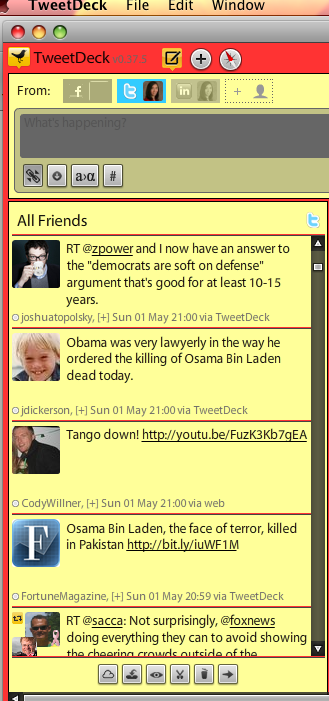As the Rupert Murdoch/News Corps/phone hacking scandal unfolds, I’ve been thinking lot about accountability. And with the focus on Murdoch and Murdoch Jr., it seems the media and public have been too. When I saw the CNN headline “Murdoch denies ultimate responsibility,” I knew I had to write a blog post to connect the dots in my head taking me back to a school project I had my senior year of college, and the learnings I think can be applied to this scandal. 
Now, you may not think a class on torture sounds very….appealing? But, I must say it was one of the most interesting and intriguing classes I took at the UO Honors college. For ten weeks we explored the torture memos of the Bush Administration and the various national and international laws surrounding the contentious issues of waterboarding, false imprisonment, military tribunals, Guantanamo, Abu Ghraib, the death penalty and other such related topics. The class culminated with a mock trial of “The Bush Six,” six former officials in the Bush Administration, with half of us serving on the prosecution and half on the defense as these officials were charged with committing war crimes. I won’t get into the line of reasoning and evidence we had to use to convict on the prosecution side (to which I was randomly assigned) but will share the main underpinning of our argument, and the one that I think is especially applicable to this discussion: chain of command, or, command responsibility.
The difficulty in proving guilt was the fact that all of these senior officials (obviously) did not carry out the torture themselves. And they often denied knowing the extent of abuses committed on detainees, just as James Murdoch and papa Murdoch have said they had no knowledge that Brooks and Les Hinton (former News Corp officials who have resigned) knew of the extent of phone hacking at the News of the World. While admitting he had “perhaps lost sight” of what was happening, Murdoch has made it clear that the News of the World accounted for less than 1% of News Corp, and thus his involvement in day-to-day operations were limited.
So, how does one justify “charging” and “convicting” officials like Cheney and Rumsfeld for torture when they came nowhere near the victims? And what lessons can we apply to the Murdoch fiasco? First, a brief history on command responsibility.
The idea of command responsibility was incorporated into the Army field manual as early as the Civil War. Article 71 of General Orders No. 100, which became known as the Lieber Code, regulated accountability by imposing criminal responsibility on commanders for ordering or encouraging soldiers to wound or kill already disabled enemies. Command responsibility was cemented by the United States Supreme Court in the case of WWII commander Tomoyuki Yamashita. General Yamashita was a general of the Japanese Imperial Army during WWII. He was prosecuted in an American military tribunal for war crimes relating to the Manila Massacre and other atrocities in the Phillippines and was charged with “unlawfully disregarding and failing to discharge his duty as a commander to control the acts of members of his command by permitting them to commit war crimes.” The Yamashita defense acknowledged that atrocities had been committed but contended that the breakdown of communications and the Japanese chain of command was such that Yamashita could not have controlled his troops even if he had known of their actions. He was sentenced to death. The Yamashita case was subsequently appealed to the United States Supreme Court by way of an application for habeas corpus. The Supreme Court ruled against Yamashita. The majority court decision stated, “It is evident from the conduct of military operations by troops whose excesses are unrestrained by the orders of their commander would almost certainly result in violations which it is the purpose of the law of war to prevent. Its purpose to protect civilian populations and prisoners of war from brutality would largely be defeated if the commander of an invading army could with impunity neglect to take reasonable measures for their protection. Hence, the law of war presupposes that its violation is to be avoided through the control of the operations of war by commanders who are to some extent responsible for their subordinates.” The Geneva Conventions itself has codified the idea of command responsibility in its 1977 additional Protocol. Article 86(2) of the Additional Protocol to the 1977 Geneva Conventions states that: “the fact that a breach of the Conventions or of this Protocol was committed by a subordinate does not absolve his superiors from …responsibility … if they knew, or had information which should have enabled them to conclude in the circumstances at the time, that he was committing or about to commit such a breach and if they did not take all feasible measures within their power to prevent or repress the breach.”
All that being said, it is clear that the international community has long acknowledged the idea of command responsibility when it comes to military actions. So why don’t we always hold our public figures, government and corporate leadership as accountable? When you run a company, you are ultimately responsible for the actions of that company, just as a military leader is ultimately responsible for the actions of his or her brigade. Now, I’m not trying to make the sweeping assumption that military rules are applicable everywhere. And I don’t know enough about News Corp or the details in this case, so I’m not implying that I think the Murdochs should receive any particular punishment. But, I do think that in general, leaders – government, corporate or otherwise – always must face a certain level of responsibility for those below them. In Murdoch’s case, the “I didn’t know” and “I deny responsibility” excuse should not fly – with the people of Britain or with Parliament. You must ask, “Shouldn’t so much wealth and power come with some responsibility and accountability?”



 Posted by lynnhector
Posted by lynnhector 






